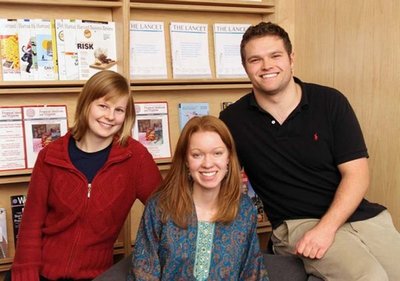December 3, 2009
‘Skeptical optimists’ push for better global health data
The post-bachelor fellows at the Institute for Health Metrics and Evaluation (IHME) thought they were gathering for just another career counseling session. They had been to these meetings before, usually to hear an inspiring talk from someone who had made a significant contribution to global health.
But this time, Richard Horton, the editor of one of the world’s premiere medical journals, The Lancet, laid down a challenge to the young people in the room: Tell me why anyone should care what young people think about public health around the world, he said.
“He started going around the room and asking us to yell out what we thought were the biggest issues in public health, and he was writing them down on the white board,” said Kyle Foreman, a fellow who graduated from Harvard University with a Bachelor of Arts in psychology and neuroscience and is now pursuing his master’s in public health at the UW. “He then told us to come up with a way to tie it all together.”
Foreman shouted out a term that resonated with the rest of the room: “skeptical optimism.” The post-bachelor fellows are part of a generation of young people accustomed to getting up-to-date information in real time. They believe their ideas and actions can make a difference, but they want to see the evidence. Now.
Horton urged them to turn that ethic into an essay. If it was good enough, he would print it. The result, “Skeptical optimism: a new take on global health data,” was published last month in The Lancet.
Co-authored by Foreman and nine other fellows, the essay describes how facts about trade, the weather, and popular culture are readily available, but accurate health data remain elusive. They argue that the way to solve “the irony and the urgency of this crisis in available data” is to democratize the gathering of data, by involving policymakers and fieldworkers in low-income countries and helping them raise the level of data quality.
“Good intentions are necessary, but they’re not sufficient,” said Susanna Makela, a fellow who earned her Bachelor of Science in applied mathematics at Brown University before entering UW’s Master of Public Health program. “Most mornings, I can get up and check my laptop to know exactly what time my bus is coming. But I can’t tell you with the same accuracy how many people are being helped by AIDS medications. That’s a problem.”
In October, millions of people around the world saw the work of the IHME post-bachelor fellows in action when the Bill & Melinda Gates Foundation launched its “Living Proof” project to highlight success stories in global health. The foundation asked IHME to provide health data for the presentation, and the fellows responded with estimates for child mortality, skilled birth care, and malaria prevention efforts.
“That was a nice validation of the direction the IHME fellows are going,” said Jeanette Birnbaum, who earned her Bachelor of Arts in Chemistry and Physics at Harvard University and recently returned from her IHME field placement in Botswana. “Optimism without skepticism means you can follow your passion and never know whether you are helping people.”



